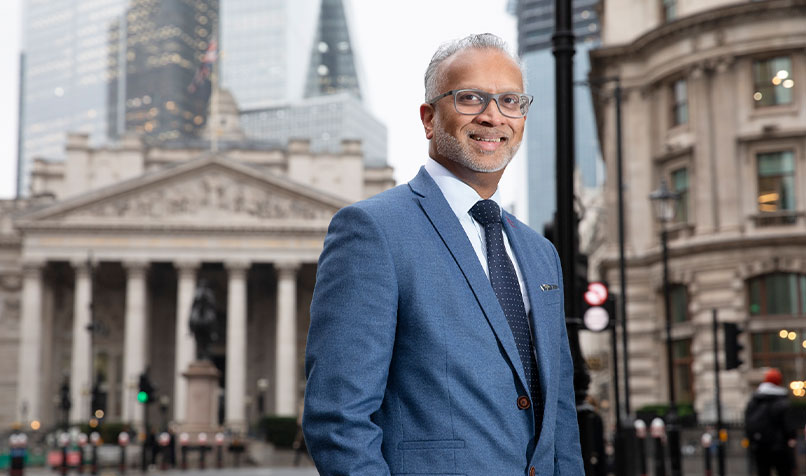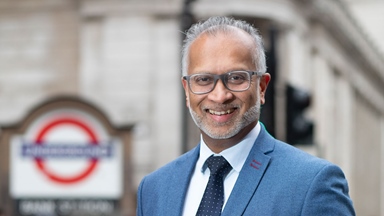Loading component...
At a glance
- Rajeev Adrian FCPA became CEO and managing director of ABC International Bank in London in July 2021.
- He has a bachelor of commerce from the University of Western Australia and an MBA from the Cranfield School of Management in the UK.
- Adrian has made tactical career moves throughout his career, which he says enabled him to tackle his current role.
By Katie Langmore
The strategic long game has never been far from Rajeev Adrian FCPA’s mind.
When he was a child, Adrian’s family moved from Sri Lanka to India and then the US, firmly setting his career on the path of diversity.
To use diversification as a career strategy in itself, Adrian believes people need to seek opportunities and make choices that teach them, expand their skill set and differentiate them from others.
“I made very calculated decisions to give myself a broad, rounded experience,” he explains.
Adrian moved to Australia in 1990 to earn his undergraduate degree. Following this, to gain an understanding of how organisations function, Adrian worked first as an auditor with the Office of the Auditor General in Western Australia and then as an investigator at the Australian Securities and Investments Commission.
Then, in 1995, he moved to the UK to study. “I consciously chose the UK for my MBA to make myself more international, because I had already studied in Australia and the US,” he says.
"If I had moved in a linear path, I would be a CFO at best, but, even then, I feel companies are looking for strategic CFOs. If I hadn’t made those moves, I don’t believe I would be a CEO today."
After completing his MBA studies, Adrian remained in the UK and worked in the banking sector. He made sideways moves to cover a range of different disciplines, including finance, business development, strategy and operations – for a different company each time.
“If I had moved in a linear path, I would be a CFO at best, but, even then, I feel companies are looking for strategic CFOs. If I had not made those moves, I do not believe I would be a CEO today.
“Playing the long game takes us out of our comfort zone and requires us to forgo short-term gain,” he says.
“Many of my colleagues were progressing up the career ladder faster than I was, because I kept moving sideways or even downwards. I often worked for people much younger than me who had taken a more linear path.”
Adrian kept making bold choices and moving into new areas. This included taking up an invitation by his manager at the time, head of business at The Royal Bank of Scotland, to make a spontaneous move to the Netherlands in 2007.
“We took over ABN Amro, the largest Dutch bank, so he invited me to move to Amsterdam, but he asked me on a Friday and wanted me to move on the Monday,” Adrian recalls. “I went home and told my wife, ‘Oh by the way, I’ve got this opportunity, but I need to move in a few days’. She was very supportive, and the family followed me there.”
This winding path has led Adrian to his current role, as CEO and managing director at ABC International Bank in London, a subsidiary of the global Bank ABC Group, where he is responsible for the UK and European operations.
Taking a strategic approach to reaching the C-suite requires a determined yet flexible mindset.
“You need to recognise that five strategic career moves to the top may become 10 and that you are only competing against yourself,” he says. “Don’t compare yourself to others along the way – it will tempt you to make choices towards short-term gain,” he says.
Career Suite courses
Career tips

Aim to acquire and demonstrate soft skills
Several of Adrian’s career moves occurred because he was head hunted. These opportunities came, he believes, because colleagues and prospective employers recognised his soft skills in addition to his technical skills.
“To make those opportunities arise, people need to see you. They need to see that you are resilient and that you can work well with people – that your EQ is as strong as your IQ,” he says.
It is also important to seek situations where you can acquire the skills you lack. “If you feel nervous about public speaking, for example, consciously put yourself in situations where you are acquiring that skill,” he explains. “It is very good to recognise your strengths, but a lot of people do not proactively address their weaknesses.”
Look after your physical and mental health
Whether you are in the top job or working long days to get there, a good work/life balance and strong support network is key.
“As you rise up in your career, positions at the top can be very lonely,” he says. “The decisions you make have an impact on many people’s lives, so you need to find the space and the support to have belief in yourself and your decisions.”
Adrian also believes in the power of exercise and finding passions outside work to maintain wellbeing and a sense of balance. In addition to spending time with his family, Adrian swims, cycles and plays tennis. “I try to get to the gym, even if it has to be at 5.30am or 9pm.”
Appreciate connections
Throughout his career, Adrian has forged strong connections with colleagues. “Accounting can be quite autonomous, and people do not always take the time to recognise and develop connections with others in their organisation,” he says. “Yet we learn new dimensions of the organisation and learn of new opportunities through such connections.”
Lead with humility
The days of dictatorial leadership are gone and, with them, the invulnerable leader, he says.
“As a leader, don’t ever ask anyone to do something that you are not prepared to do yourself. If I ask someone to come in every single day, I need to be prepared to do that too. You need to be the example and lead with principles and values.”
Leading with humility is a strength, he adds. “Respect is earned – it is not an entitlement.
You don’t have all the answers, and even the most junior person in your team might have a great solution to a problem you are grappling with.”
6 team leadership strategies that work
Recruit for diversity
Adrian says that one of the great mistakes leaders make in the recruitment process is employing people who are too similar to themselves.
“You need to feel confident recruiting people who will bring new skills to the team and might even do the job better than you could. Recruit to complement, not supplement, your strengths,” he says.
The diversity will provide a breadth of knowledge and experience that enables better growth, as well as create a richer work environment. “The more diversity you have in your team – of skills, personalities, gender, religions, cultural backgrounds – the better.”
Stay current
Be a person who strives to understand current issues, Adrian says, because it will give you the opportunity to bring different perspectives to discussions and strategic decisions. “When you’re a leader, you’re working to shape thinking and the only way you can keep doing that is to develop the ability to anticipate change.”

